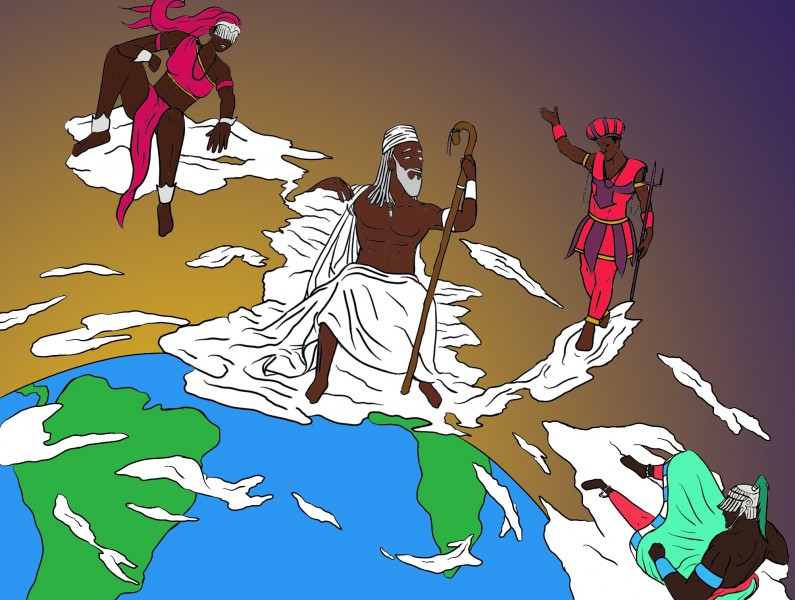Black history is world history: Exploring African diaspora mythos, religions
Black history is so massive and enriching, border lines and oceans cannot possibly measure it. During Black History Month, Americans recognize the hardships and oppression Black people continue to face in the U.S., but one can also celebrate the excellence and beauty in Black culture and its people. Black history is all over the world, from rich Africa to the continental Americas and the turquoise waters of the Caribbean. Here are few of many intriguing Black cultures and religions to help globalize your knowledge of Black history.
One of the more well-known religions, Voodoo is near synonymous when it comes to our favorite city of New Orleans. Voodoo first started out as Haitian Voodou, a separate religion in itself. Voodou originated from customs and traditions of West African tribes that were filtered when enslaved Africans were forced to migrate to Haiti. After the Haitian Revolution, French planters brought their slaves with them to Louisiana, where Catholicism mixed with Haitian Voodou to transform into the Voodoo we know today. Read more about the origins of Voodoo here.
The Brazilian state of Bahia is remarked as the Afro-Brazilian cultural capital of the country. After all, Brazil has the largest population of people of African descent outside of Africa. The Candomblé religion is prominent in this state, especially its capital city of Salvador. Candomblé combines traditions brought to Brazil from enslaved peoples of different regions in Africa, including the Yoruba and Bantu cultures.
Candomblé consists of one god, Oludumaré, and lesser but still powerful deities called “orixas,” who control elements such as the oceans, love, fire and conflict. One of Candomblé’s teachings is that each individual is guided by an orixa who guides and protects them in their life. Furthermore, Candomblé means “dance in honor of the gods” in a Bantu-family language because music, dance and ceremonies are essential for calling the orixas to the realm of Earth.
The Zulu people continue to inhabit Southern Africa, especially the country of South Africa where the Zulu are the largest ethnic group. The Zulu creation myth revolves around one all-powerful god, Unkulunkulu. Unkulunkulu sprouted from one big seed out of darkness, and became the first man on Earth. He gathered other humans who sprouted from other seeds and taught them how to hunt, make clothes and other essential practices. He also harvested animals from the seeds and gave them their names, in addition to creating the mountains, rivers, Sun, Moon and other elements of the Earth.
Shortly thereafter, Unkulunkulu created a chameleon messenger to carry the message to mankind that everyone is immortal. Since the chameleon, however, is a very slow creature, Unkulunkulu sent a lizard messenger after growing impatient of the chameleon’s slowness, travelling faster but instead bringing death to mankind. The lizard continues to roam the Earth, bringing death to any human it passes.
Bori is also known as Hausa animism, since it is practiced by some of the Hausa people of West Africa. Bori revolves around spiritual possessions, because followers of Bori believe everything on Earth, whether living or nonliving, houses a spirit. Instead of seeing spirits as a negative force, followers of Bori see spirits as a positive energy with the power to heal. Historically, Bori followers rely on priestesses to lead ceremonies calling for the aid of the spirits. Modern Bori is a mixture of traditional Bori and Islamic teachings, as a result of Muslims spreading the religion into Africa in the early 19th century.
This religion and socio-political movement is a combination of Christianity, pan-Africanism and Ethiopianism, originating from the Caribbean island nation of Jamaica. Rastafarianism started in the 1930s when Haile Selassie I was crowned King of Ethiopia. Rastafarians believe King Selassie to be the reincarnation of God, who would liberate all black people around the world from their present suffering and oppression as a result of colonization and the slave trade.
In Rastafarianism, Africa is seen as the home of all black people around the world, calling for the unity and solidarity of black communities everywhere. Rastafarian customs include following strict dietary rules, letting hair grow naturally and practicing meditation. Rastafarianism drew worldwide attention during and after the life of famous reggae Jamaican artist Bob Marley.
Your donation will support the student journalists of Tulane University. Your contribution will allow us to purchase equipment and cover our annual website hosting costs.



